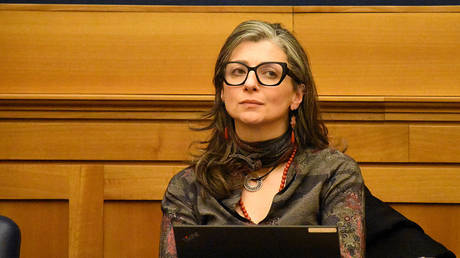
Washington is running out of money for the conflict, with further aid trapped in a deadlocked Congress
Some 45% of Americans believe their country is sending too much money to Ukraine, according to an AP-NORC poll published on Wednesday. Just 38% of respondents said the current amount of spending on Ukraine was “about the right amount.”
That figure has increased since last month, when 31% gave a similar response, and the percentage who think too much money is going to Kiev is down from 52%. However, the US is also spending less on the conflict than it was last month.
The Pentagon warned Congress in early October that it had run out of long-term funding for Kiev’s military through the Ukraine Security Assistance Initiative and nearly exhausted another line of funding, begging legislators to pass another aid package before they had to choose between the country’s own military readiness and Ukraine’s.
Republicans in Congress nevertheless removed Ukraine aid from a must-pass stopgap budget bill earlier this month to keep the federal government open through the new year. Many have signaled that supplying foreign aid to Israel for its war in Gaza and even funding domestic border security are more judicious uses of taxpayer dollars.
The same AP-NORC poll found sanctions against Russia to be the most popular of four policies for supporting Ukraine, favored by 63% of respondents. Providing weapons and accepting refugees both met with approval from 48%, while sending government funds directly to Kiev was supported by just 39%. A small but vocal faction of lawmakers in Washington have demanded accountability for the money sent to Ukraine, pointing to the country’s reputation – attested to by its own residents – as a hive of corruption.
Growing disillusionment with US backing for Kiev comes as even senior Ukrainian political officials have reportedly lost faith in their leader, with a recent report claiming President Vladimir Zelensky’s top aides consider his belief that Ukraine can still defeat Russia on the battlefield to be “delusional.” While Ukrainian military commander General Valery Zaluzhny told The Economist earlier this month that the conflict had reached a “stalemate,” Ukrainian media outlets have attempted to spin the failed summer counteroffensive as a wildly successful psychological operation, claiming it had been a ruse to convince Moscow that Kiev was on the brink of defeat.
US Defense Secretary Lloyd Austin made an unannounced visit to Ukraine earlier this week to reassure Zelensky of US backing, promising to “continue to support Ukraine’s sent battlefield needs and long-term defense requirements.”
At the same time, Treasury Secretary Janet Yellen said continued funding to Ukraine was a “critical priority” for the US.




